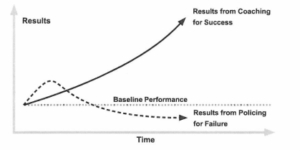
Don’t police for failure when you can coach for success
A regularly scheduled coaching session with each member of your team is the best way I know to help each person achieve personal success and create great results.
To have a great coaching session, you need to have taken the time to get to know each of your staff and to understand their strengths and weaknesses. This is only the beginning, however. The key is how you use this knowledge.
Traditionally, many leaders have a regular review with each of their staff when they outline areas of potential improvement. The underlying message is that if the person can improve in these areas they will achieve success. This approach will indeed create some improvement in the short term. Most people are starved for feedback in the workplace. Taking the time to point out where they can improve will often move the needle, but only temporarily. You can see this bump on the graph below. This is the trap into which many leaders fall. They have seen some success with what I call policing for failure, an approach designed to keep your team members on the straight and narrow by pointing out what they are doing wrong. When you obsess about avoiding failure, you are not focused on achieving success. Over time, if you keep the focus on avoiding failure, results will diminish, as shown below.
The much better approach is to share with each of your staff where you see them shine. Share what you think their strengths are and set goals with them, both for their personal development and goals for their work. Update this discussion every six to eight weeks with each staff member. The result is continual growth and an engaged staff member. It’s called “coaching for success”. The graph says it all.
